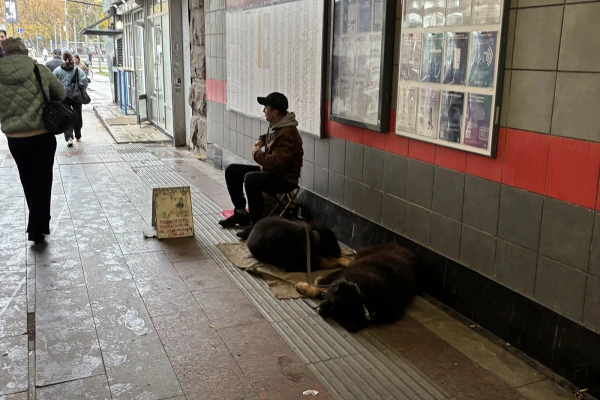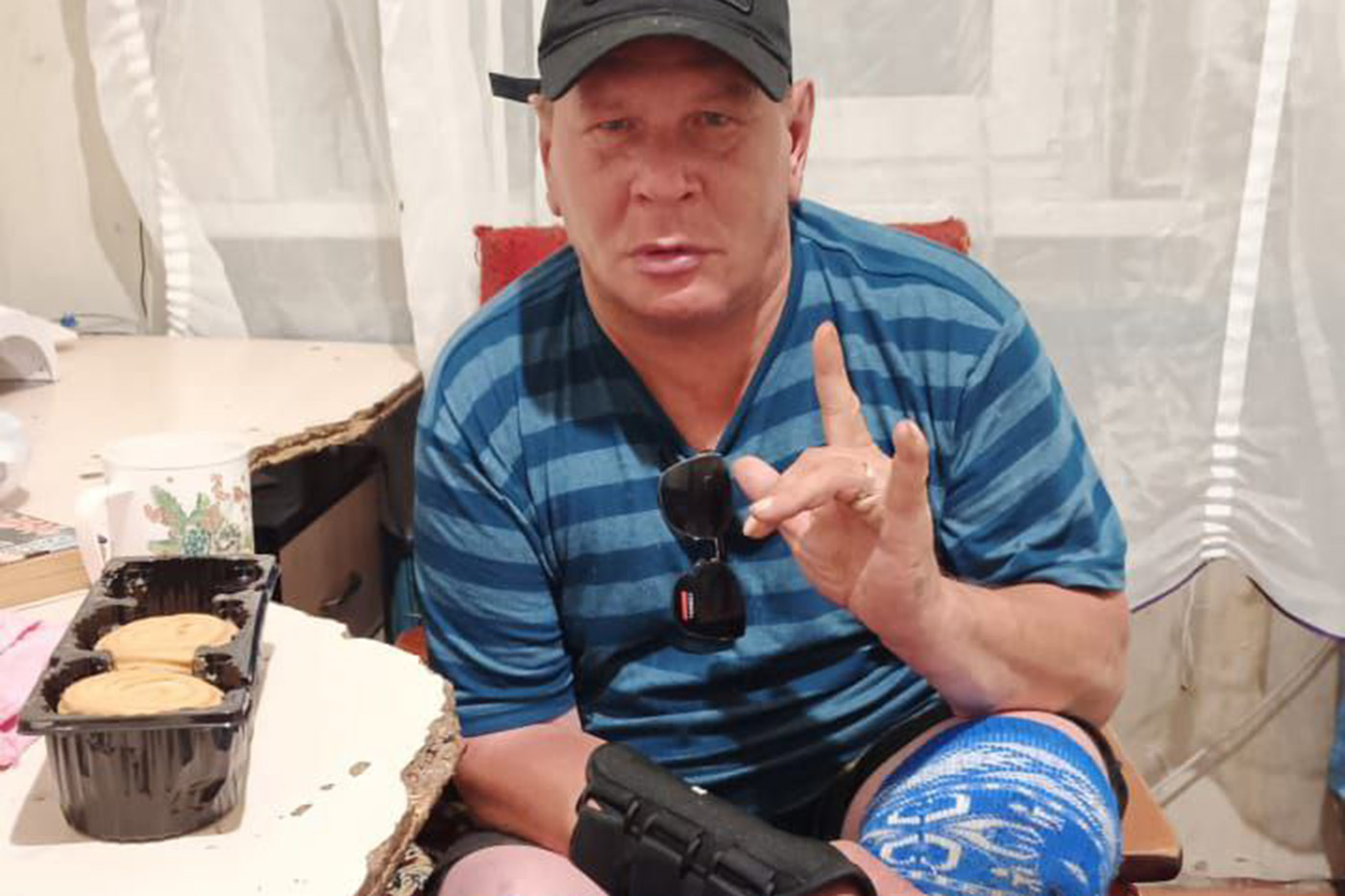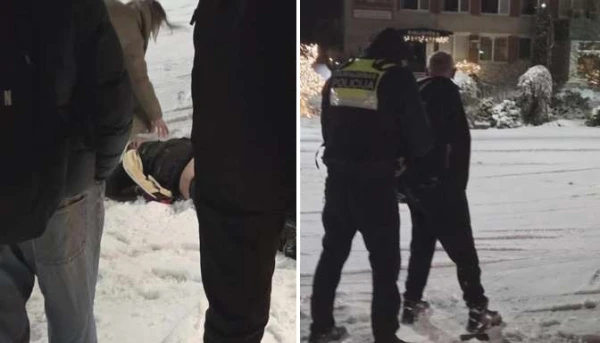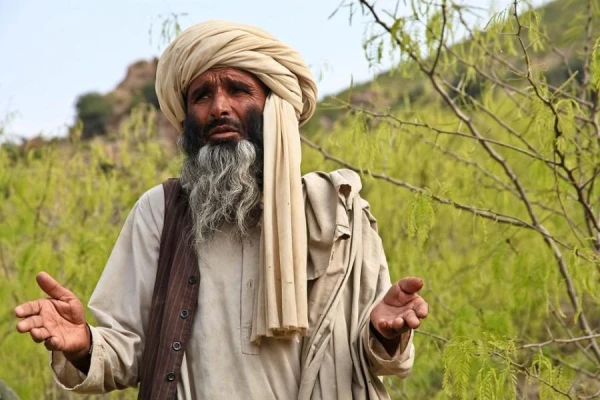
Legless war veteran fell into the trap of addiction.
Sergey Gribkov, a veteran of the first Chechen campaign, has no legs. He spent nine years in slavery. His "owners" would get him drunk and force him to beg, then take all the "earned" money from him, beating him if they thought he was not working hard enough.
Sergey Gribkov will turn 49 this year. He looks like a person who has lived on the streets for a long time, with his hands folded on his knees, fidgeting with his fingers and constantly looking away, as if silently seeking support from Ksenia—a volunteer who took him in after he was freed from slavery.
Sergey communicates very sparingly, answering questions with one-word replies. Ksenia explains that this is the result of nearly a decade spent in slavery, during which Sergey was actively intoxicated and regularly beaten.
"Right now, he is like a child—I've worked with a psychologist who told me to communicate with him as I do with children—so that he can restore his trust in people," Ksenia says.
"When you start talking to him about slavery, his eyes change, there is still fear in them. Just recently, two women came to our volunteer, claiming to be his sisters. We video-called, and Sergey was immediately frightened. He said, 'This is a woman who works for the Gypsies; she is their protector,'" Ksenia recounts.
According to Ksenia, the former "owners" do not cease their attempts to find Sergey and bring him back. They also threaten the volunteers who help him return to a normal life.
No one knows exactly how many people are enslaved around the world, but the International Labour Organization estimates the scale of modern slavery at nearly 50 million people. Of these, about two million are in Russia, says lawyer Bulat Mukhamedzhanov, coordinator of the "Nivola" project, which deals with cases of slavery in Russia. He also explains that the term slavery includes sexual exploitation, forced labor or forced marriages, customs that may resemble slavery, and human and organ trafficking.
Once enslaved, Sergey Gribkov was forced to "work," that is, to beg, in Moscow, Nizhny Novgorod, Veliky Novgorod, Almetyevsk, but mostly in St. Petersburg. To this day, thousands of beggars, homeless people who also ask passersby for money, and professional beggars with various stories—ranging from a sick child or relative to lost documents and the inability to return to their hometown—remain in both large cities and smaller towns. According to Bulat Mukhamedzhanov, any person begging for money on the street could be enslaved.
Sergey was born in Yaroslavl, but at an early age, he ended up in an orphanage with his older brother and two younger sisters. Even before reaching adulthood, he had to travel around the region between orphanages and boarding schools. After the ninth grade, in 1989, he enrolled in college, studied to be a tractor driver, and worked one season as a laborer in an orphanage before setting out to find relatives across the country.
"This is the dream of any child from an orphanage," Ksenia explains.
From his personal file in the orphanage, which Sergey was fortunate enough to glimpse, he knew that he had a brother and a mother in Yaroslavl. However, upon arriving in his hometown, he found out that his mother had long since passed away and his brother was in prison.
In 1994, Sergey was drafted for military service, and in 1995 he found himself in Chechnya, where, according to him, he lost both legs below the knee. But upon his return, he did not receive a disability group because it turned out that upon reaching adulthood, Sergey was discharged from the orphanage into nowhere, and he no longer had a registered address. He also did not know that graduates of orphanages were entitled to housing.
As a result, Sergey had to continue his travels across the country, getting by with minor jobs and living with acquaintances. This went on for almost ten years.
Sergey ended up in slavery by chance: in Nizhny Novgorod, he got involved with a "fun company," drank with them, was beaten, and had his documents stolen. When he came to, he even tried to restore his documents himself through a rehabilitation center, but the process dragged on, and he was advised to go to St. Petersburg, supposedly to restore his documents faster there.
After that, life took a downward turn: one day, he, a legless disabled person, was noticed near the Alexander Nevsky Lavra by some people whom Sergey calls Gypsies. They began to ask him about his life and promised to help him restore his documents, told him that he was entitled to housing from the state, and took him to their home.
In an apartment on the outskirts of St. Petersburg, there was already another disabled person. For about a month, nothing happened; Sergey just recovered from the "drinking parties," he recalls. There was no talk of restoring documents, although he was continually promised any possible help. When Sergey recovered from his wanderings, the people who took him in began to reproach him for being a burden on them—and suggested he work.

"Then I was told that I needed to earn money for this. But how could I earn? By begging," Sergey recalls.
He admits that he realized his situation and that his so-called "benefactors" were keeping him in slavery only after a year. All this time, he was convinced that he would soon be helped to restore his documents and released. Meanwhile, the food became worse—lunch consisted of a sandwich and a "shot" of alcohol.
Soon, they began to reproach him for bringing in little money—on holidays and weekends, he could collect up to ten thousand rubles, on weekdays—less. If he brought in little, he was not fed, beaten with a wire cord on the back, and had his teeth knocked out. Ksenia recounts that although Sergey did not intentionally show it, she saw scars on his back from such beatings. Of all the medical help provided by the "owners," Sergey can only recall how wounds were treated with "Badyaga" and once a cast was put on his broken arm. That was the extent of the help.
Almost all the time, Sergey was watched by a family member of the people who held him in slavery, so he could not ask passersby for help. The people themselves also did not show much interest in him, "refusing to engage" when he tried to talk to them.
"People just gave out of pity. All of St. Petersburg already knew that we were sitting there not just for fun. Almost everyone knew," Sergey is convinced.
Once, Sergey even tried to escape—but he was found and severely beaten, breaking his arm, which then healed improperly and still causes him a lot of trouble. Ksenia explains that Sergey cannot even clench his fingers into a fist without pain; he needs surgery, but it is impossible to perform it without documents and an insurance policy.















Leave a comment